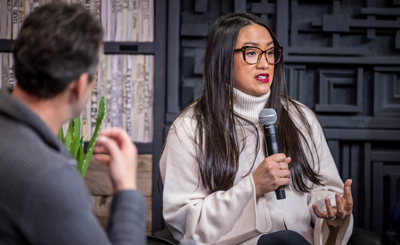Betty Irene Moore Fellow’s film premieres at Sundance Film Festival
‘Language of Care’ explores health care barriers for people who are deaf
Jan. 30, 2023
 Betty Irene Moore Fellow Michelle Litchman, 2021 cohort member and assistant professor at the University of Utah College of Nursing, discussed the "Language of Care" during a panel discussion after the film premiered at Sundance Film Festival 2023. Photo courtesy of University of Utah Health.
Betty Irene Moore Fellow Michelle Litchman, 2021 cohort member and assistant professor at the University of Utah College of Nursing, discussed the "Language of Care" during a panel discussion after the film premiered at Sundance Film Festival 2023. Photo courtesy of University of Utah Health.
Improving access to health care in the Deaf community is a highly personal endeavor for Betty Irene Moore Fellow Michelle Litchman. Witnessing the struggles of her six family members who are deaf, she strives to bridge the communication gap between people who are deaf and health care providers. Her work is highlighted in “Language of Care,” a film by the University of Utah that premiered Jan. 23 at Sundance Film Festival 2023.
Highlighting new models of care
In the film, Litchman, a 2021 cohort Betty Irene Moore Fellow, assistant professor at the University of Utah College of Nursing and medical director of the Intensive Diabetes Education and Support Program at the University of Utah, shines a spotlight on the challenges faced by individuals who are deaf when seeking health care and the importance of effective communication in health care. She discusses the development of the Deaf Diabetes Can Together program, which brings health care providers, researchers, access designers and members of the Deaf community together to strategize a new model of care for patients who are deaf.
“People who are deaf are three more times likely to develop diabetes than hearing people. The majority of people who are deaf do not have equal access to health care,” Litchman said. “We are working to change that narrative by working with the Deaf community to understand and address their unique needs and create educational resources that are accessible and accurate.”
Putting fellowship experience to work
Watch the "Language of Care" film »
This endeavor and Litchman’s personal connection to the effort were selected by the University of Utah and the filmmakers for Sundance following several rounds of interviews. She credits the Betty Irene Moore Fellowship for Nurse Leaders and Innovators and program faculty member Barbara Glickstein with helping her prepare her pitch.
“In the fellowship program, we learn about strategic communications and how to make media pitches about our research. I reached out to Barbara Glickstein for support and she helped me refine my pitch to the film director, producer and University of Utah representatives,” Litchman said.
Glickstein, a public health nurse and media strategist specializing in training national health care leaders to advance public health and policy through media platforms, said she was delighted to work with Litchman on this project.
“Dr. Litchman has an incredible story to tell and it was a privilege to work with her on identifying ways to illustrate her story and the impactful research she is conducting,” Glickstein said. “I am so excited for her and I hope this film generates additional interest in these new models of care.”
Heather M. Young, fellowship national program director, said the film is a powerful reminder of the importance of effective communication in health care and the impact it can have on people’s lives.
“Dr. Litchman’s work is a shining example of how nurse leaders can make a huge difference in the communities they serve through advocacy and innovation. She is taking her project to another level of system change. Our fellowship team is thrilled to see her efforts showcased in this film and we are so grateful to Barbara Glickstein and all of our program faculty members for helping our fellows achieve their goals,” Young said.
Litchman said she hopes the film opens people’s eyes to the health disparities often faced by members of the Deaf community and that it inspires support for this unique type of partnership is which people help co-design their own care. This model of care is being replicated for rural, Pacific Islander and other underrepresented communities.
“I’ve seen how unequal access to care negatively impacts the health of individuals and communities. As a nurse practitioner and child of a deaf adult, I know we can do better. But we have to work with the community, including people who are deaf and have diabetes, deaf researchers, and certified deaf interpreters. They lead us every step of the way,” Litchman said. “Having institutional and financial support for this work is key to expanding our reach and having an impact on policy and procedures at the national level.”
About the film
The “Language of Care” is the third film in the U of U Health-produced series New Narratives in Health, which brings together scientists and artists to more broadly communicate advances in knowledge. It was directed by Oscar-winning filmmaker Ross Kaufman, who is known for his work on “Born into Brothels,” “Of Medicine and Miracles” and “Tigerland.” The director of American Sign Language was Dickie Hearts. The film was produced by Robin Honan with executive producers Joe Borgenicht of U of U Health, award-winning documentarian Geralyn Dreyfous and Heather Kahlert of the Kahlert Foundation.
Learn more at languageofcareutah.org »





